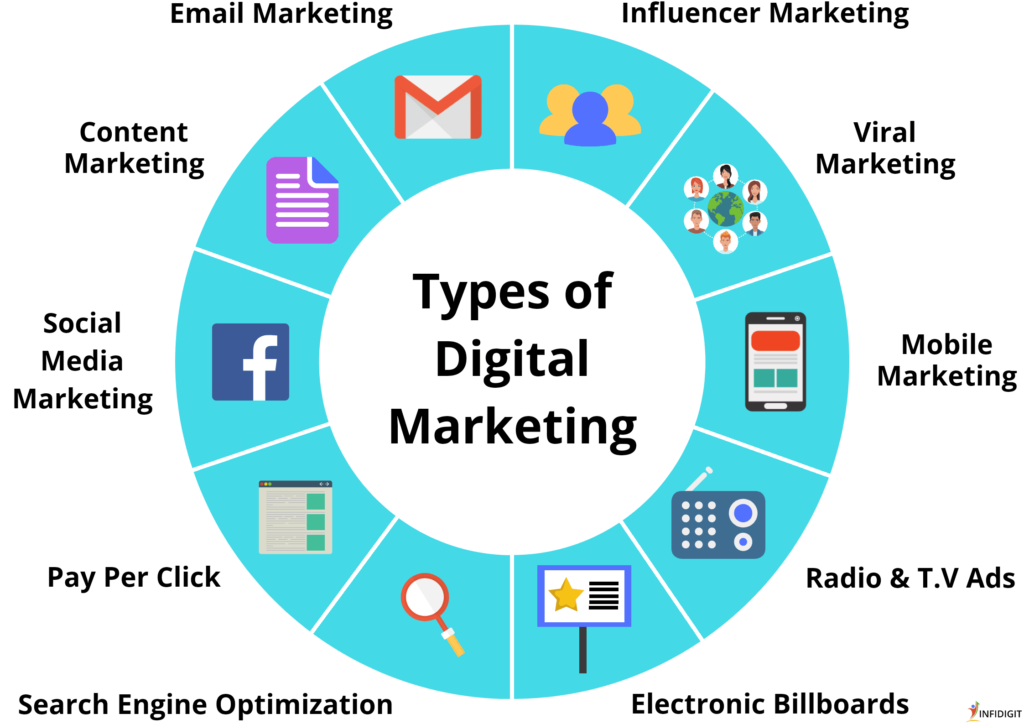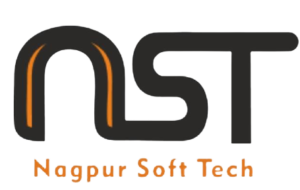
Types of Digital Marketing
In today’s fast-changing digital world, moreover, businesses of all sizes are using digital marketing to reach their audiences. Therefore, knowing the different types of digital marketing is essential for success. Let’s begin by exploring the major categories that define this dynamic field.
What Is Digital Marketing?
Digital marketing is the process of promoting products or services using online channels and tools. In addition, it provides business houses with a platform to interact with their customers in a better way than any traditional method. For example, from social media, email, to search engines, digital marketing is a very wide term. Ultimately, it has become essential for businesses to thrive in today’s competitive market.
Why Is Digital Marketing Important?
It allows for a global reach. Moreover, personalized targeting is possible. Additionally, it is cost-effective and hence feasible for small businesses as well. Furthermore, performance metrics provide a scope for continuous improvement. With this foundation, let’s proceed with the different types of digital marketing.
Types of Digital Marketing
Search Engine Optimization (SEO)
SEO is the process of optimizing a website to rank higher on search engine results pages (SERPs). By doing so, businesses can improve their online presence and attract more visitors. Specifically, by focusing on keywords, backlinks, and user experience, businesses can drive organic traffic.
Key Benefits of SEO:
- Firstly, it enhances online visibility.
- Secondly, it generates high-quality leads.
- Moreover, it is long-term cost-effective.
On-page SEO, off-page SEO, and technical SEO are the types of SEO strategies. As a result, websites designed with SEO best practices have a higher chance of attracting and retaining visitors.
Content Marketing
Content marketing is the process of creating and sharing valuable content to attract and engage an audience. For instance, it can include blogs, videos, infographics, and eBooks.
Examples of Content Marketing:
- To begin with, blogging to answer common questions
- Additionally, video tutorials
- Moreover, infographics
As a result, this approach helps a brand gain credibility and build trust with the target audience through valuable information.
3.Social Media Marketing
Social media is now a mighty tool for reaching customers. In particular, through social media marketing, brands use various social media websites like Facebook, Instagram, LinkedIn, and Twitter to promote products and engage the audience.
Benefits of Social Media Marketing:
- Firstly, instant reach with a global audience
- Secondly, real-time customer engagement
- Additionally, highly targeted advertising options
Furthermore, organic posts, paid advertisements, and influencer partnerships are strategies of social media marketing. By leveraging these strategies effectively, brands can maximize their impact and connect with their audience on a deeper level.
Pay-Per-Click Advertising (PPC)
PPC is an advertising mechanism in which organizations pay only after people click their advertisements. For example, one of the most popular PPC services used by many marketers around the world is Google Ads.
How PPC Works:
- Firstly, keyword targeting is essential.
- Next, the advertiser places bids on such keywords.
- Finally, the ad appears at the top of SERPs or on other digital mediums.
Moreover, PPC campaigns can provide quick results. As a result, they are the best option for time-sensitive promotions.
Email Marketing
Email marketing is still one of the best methods to nurture leads and maintain customer relationships. By leveraging personalized messages, businesses can keep their audience updated and engaged.
Best Practices for Email Marketing:
- Firstly, use catchy subject lines.
- Secondly, segment your audience for better targeting.
- Additionally, use clear calls to action (CTAs).
Furthermore, emails can include information about products, company news, or exclusive offers. As a result, this helps businesses stay connected with their customers while building long-lasting relationships.
Affiliate Marketing
Affiliate marketing is a type of partnership between the business and other individuals or companies that are paid a commission to promote their products. In this way, businesses can reach out to more audiences without spending much on advertising upfront.
Key Features of Affiliate Marketing:
- Firstly, performance-based payouts ensure businesses pay only for results.
- Secondly, it helps reach a wider audience effortlessly.
- Moreover, there is little risk for the business as payments are tied to performance.
For example, popular websites like Amazon also offer affiliate programs to many marketers. As a result, this strategy has become a cost-effective way to boost sales and brand awareness.
Influencer Marketing
Influencer marketing leverages the popularity of social media influencers for product promotion. Specifically, influencers typically have a strong following that appreciates their recommendations.
Advantages of Influencer Marketing:
- Firstly, it ensures high levels of engagement with the audience.
- Secondly, it adds authenticity to endorsements, making them more relatable.
- Additionally, it helps in targeting specific niches effectively.
Furthermore, partnering with influencers can be a cost-effective way to enhance the visibility of the brand. As a result, it has become a powerful tool for modern marketing strategies.
Mobile Marketing
Mobile marketing has become unavoidable with the advancement of smartphones. As a result, mobile marketing reaches out to users via SMS, mobile apps, and mobile-friendly websites.
Mobile Marketing Techniques:
- Firstly, sending promotional SMS is an effective strategy.
- Secondly, developing mobile-friendly websites ensures a seamless experience.
- Additionally, running in-app advertisements helps capture users’ attention within apps.
Moreover, mobile marketing ensures businesses can reach users wherever they are, creating more opportunities for engagement and conversions.
Video Marketing
Videos are engaging and memorable, making video marketing a popular choice. For instance, platforms like YouTube and TikTok provide ample opportunities for video content.
Types of Video Marketing:
- One example is product demonstrations, which show the product in action.
- Another approach is customer testimonials, which build trust through authentic reviews.
- In addition, live streaming events allow for real-time engagement with the audience.
Moreover, videos can effectively convey messages and evoke emotional responses, thus driving audience action and increasing conversions.
10.Analytics and Data-Driven Marketing
Data-driven marketing uses analytics to understand customer behavior and optimize campaigns. For instance, tools like Google Analytics help businesses make informed decisions.
Advantages of Data-Driven Marketing:
- Firstly, it improves campaign targeting by focusing on the right audience.
- Moreover, it enhances customer experiences through personalized strategies.
- In addition, it leads to a higher ROI by investing in what works best.
As a result, data analysis allows marketers to identify what works and adjust strategies accordingly, ensuring continuous improvement in their efforts.
SMS Marketing:
Sending targeted text messages to customers with promotional offers and updates. In addition, mobile app marketing involves developing and promoting mobile apps to engage with customers on their mobile devices.
Furthermore, location-based marketing uses location data to target customers with relevant offers and promotions based on their location. As a result, these strategies allow businesses to reach their audience with highly personalized and timely content.
Conclusion
Digital marketing provides various platforms to reach out to your audience and meet the objectives of a business. In fact, every type of digital marketing has a purpose, from SEO to collaborating with influencers. By understanding and utilizing these strategies, businesses can stand out in the highly dynamic digital arena.
So, are you ready to move your digital marketing to the next level? If so, get started with these today!
